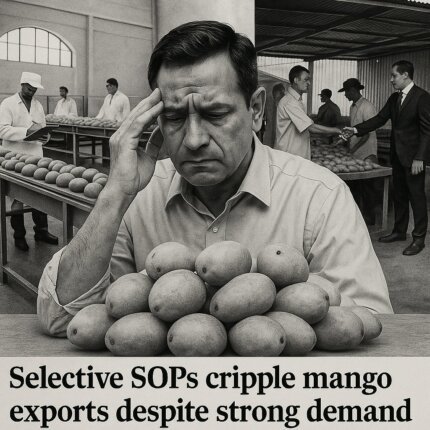Selective SOPs cripple mango exports despite strong international demand
KARACHI: Pakistan’s agricultural export sector is facing a severe crisis, with key products such as rice, corn, and mangoes suffering a dramatic collapse. While government officials continue to blame extreme weather and climate change, exporters and experts argue that the root causes lie in entrenched corruption, bureaucratic mismanagement, and discriminatory practices within the Department of Plant Protection (DPP), now operating under the newly established National Agro Trade & Food Safety Authority (NAFSA).
In a recent televised discussion in Karachi, former Director-General of Plant Protection Dr. Tasneem Ahmed and leading fruit exporter Babar Khan Durrani delivered a scathing critique of the country’s plant quarantine regime, warning that unless immediate reforms are enacted, Pakistan’s credibility in global agricultural markets will be permanently damaged.
According to official data from January to July 2025, rice exports plummeted by nearly 80%, falling from 399,679 metric tonnes in the same period last year to just 83,679 metric tonnes this year. Exports to the European Union alone dropped from 39,689 MT to around 5,000 MT, representing an 83% decline. Corn exports to Vietnam, a key buyer, fell to zero from 18,800 MT last year. While floods and climate disturbances have impacted yields, industry stakeholders emphasize that the greater threat is internal—stemming from arbitrary enforcement of new Standard Operating Procedures (SOPs) and deep-rooted favoritism in regulatory practices.
Durrani highlighted alarming discrimination in the application of export protocols, alleging that out of 21 approved mango processing plants, only three or four are being given preferential treatment. These select facilities are reportedly allowed to operate without mandatory camera surveillance and are assigned inspectors of their own choosing. He accused officials of facilitating these plants through favoritism and alleged corruption, noting that one such favored facility, occupying just 2,000 square feet, claimed to process up to 17 containers of mangoes daily—far beyond its actual handling capacity of about 250 tonnes. In contrast, much larger plants spanning 16 acres are reportedly restricted to processing only five to six containers per day. This “pick-and-choose” approach, he warned, is not only eliminating fair competition but also exposing Pakistan’s exports to the risk of international rejections.
Already, the European Union has intercepted 31 consignments of rice and mangoes this year due to non-compliance with International Plant Protection Convention (IPPC) standards, particularly regarding pesticide residues. Vietnam has similarly blocked shipments, resulting in a complete halt in corn exports. Dr. Tasneem noted that while occasional interceptions are not uncommon in international trade, Pakistan’s failure to enforce SOPs uniformly—and the absence of accountability for repeated violations—has severely undermined its trade reputation.
In response to growing complaints from exporters, the Senate Standing Committee on Food Security recently visited the DPP headquarters in Karachi. According to findings shared by Dr. Tasneem, serious irregularities were observed: one official was reportedly holding three to four technical roles simultaneously without appropriate scientific qualifications, while non-technical individuals, including medical doctors, had been appointed to key regulatory positions such as Director Quarantine and even Director General, in clear violation of service rules. Surveillance systems, intended to monitor compliance, were installed selectively—enabling favored plants to bypass oversight while stricter scrutiny was imposed on others.
Durrani also revealed that despite the government offering a $100 million waiver to facilitate mango exports to Iran—exempting exporters from financial documentation requirements—Pakistan saw no major gains. He explained that although Iran had accepted Pakistan’s hot water treatment standards, most exporters were unable to benefit because the DPP selectively granted export approvals, sidelining legitimate processors without justification.
Both panelists agreed that the collapse in exports is not merely an agricultural issue but a crisis of governance. They stressed that unless bold administrative reforms are implemented without delay, Pakistan risks being permanently shut out from key international markets. The Senate Committee has recommended the immediate appointment of technically qualified personnel such as entomologists and quarantine scientists to lead regulatory departments, uniform implementation of SOPs across all certified processing plants, and a comprehensive restructuring of the DPP or a full transfer of authority to the professionally managed NAFSA. It also called for the publication of its findings to ensure public accountability, and direct intervention by the Prime Minister to dismantle the networks enabling corruption and favoritism.
With Pakistan’s agriculture sector already reeling from climate-related shocks, this internal collapse driven by poor governance and systemic manipulation could deliver a fatal blow. Exporters and experts have raised the alarm; it is now up to the government to act decisively, restore trust, and salvage the country’s standing in global trade—or risk irreparable damage to its economic future.




